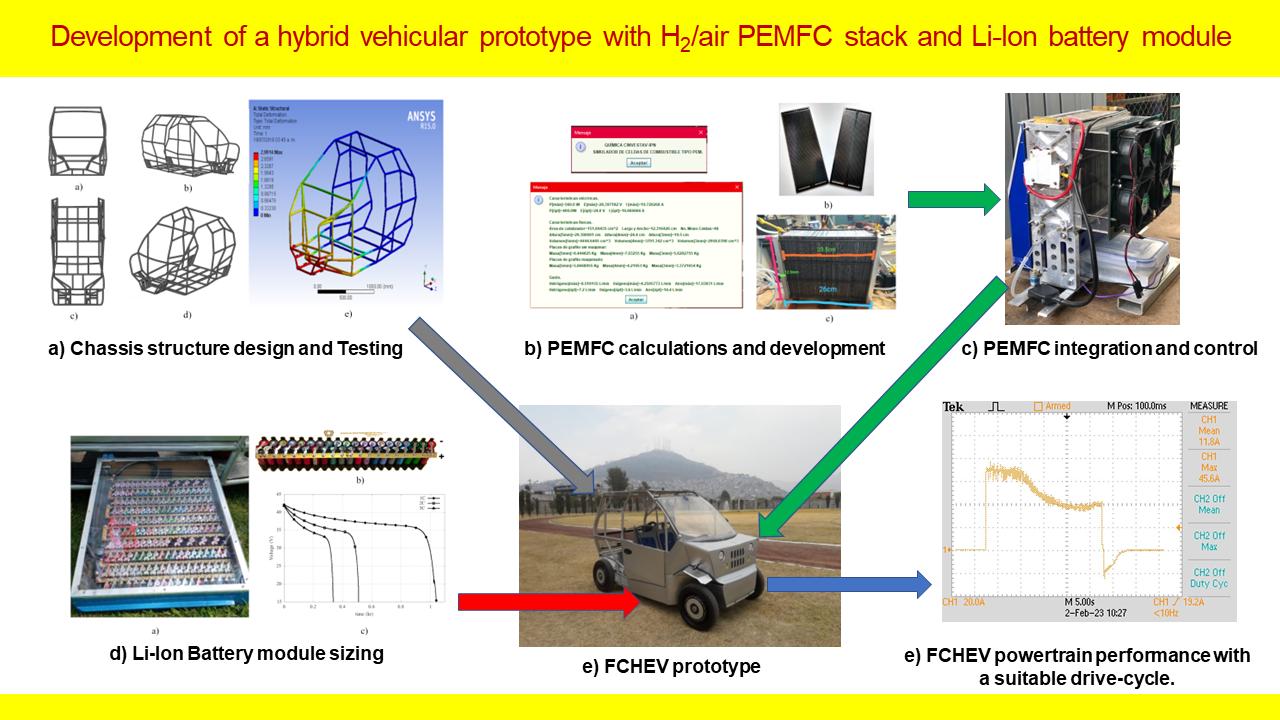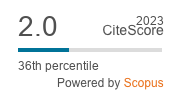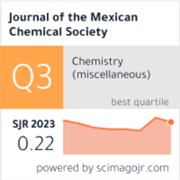Development of a Hybrid Vehicular Prototype with H2/air PEMFC Stack and Li-Ion Battery Module
DOI:
https://doi.org/10.29356/jmcs.v67i4.1987Keywords:
H2/O2 PEMFC energy sources, hydrogen catalysts, FCHEV powertrain performanceAbstract
Abstract. Recent years have marked a huge increase in worldwide efforts to improve the design and manufacture of miniaturized low- and high- power Polymer Electrolyte Membrane Fuel Cells (PEMFCs) for diverse electronic applications, ranging from stationary backup power to mobile transportation, and even as energy sources for a new generation of drone and hybrid vehicular transportation technologies. This communication compiles recent contributions developed by our group of researchers who has worked in the synthesis and characterization of Pt-based catalysts for oxygen reduction reaction (ORR) and in to address the performance and durability of H2/O2 PEMFC - Li Ion batteries in an electric vehicular transport prototype. We will provide an overview of our current contributions in the design, manufacturing, and development of low temperature, high-energy H2/O2 fuel cells which generated electricity is storage in a set of Li-Ion batteries for a vehicular transport prototype, Cinvestav-Sicarú, with more than an hour and thirty minutes of autonomy.
Resumen. Los últimos años han marcado un aumento sustancial en los esfuerzos mundiales para mejorar el diseño y la fabricación de celdas de combustible de membrana de electrolito de polímero (PEMFC) miniaturizadas de baja y alta potencia para diversas aplicaciones electrónicas, que van desde energía de respaldo estacionaria hasta transporte móvil, e incluso como energía. Fuentes para una nueva generación de tecnologías de transporte de drones y vehículos híbridos. Este trabajo recopila contribuciones recientes desarrolladas por nuestro grupo de investigación que ha trabajado en la síntesis y caracterización de catalizadores basados en Pt para la reacción de reducción de oxígeno (ORR) y para abordar el rendimiento y la durabilidad de una celda de combustible H2/O2 – banco de baterías de Iones de litio en un prototipo de transporte vehicular eléctrico. Proporcionaremos una descripción general de nuestros desarrollos actuales en el diseño, fabricación y desarrollo de celdas de combustible H2/O2 de alta energía y baja temperatura que generan electricidad y se almacenan en un conjunto de baterías de iones de litio para un prototipo de transporte vehicular, con más de una hora y media de autonomía.
Downloads
References
Wu, D.; Yi, C.; Tang, H. Electrochem. Energy Rev. 2020, 51, 1-40. DOI: https://doi.org/10.1007/s41918-020-00068-1.
Meloni, E.; Iervolino, G.; Ruocco, C.; Renda, S.; Festa, G.; Martino, M.; Palma, V. Energies. 2022, 15, 3588-3621. DOI: https://doi.org/10.3390/en15103588.
Wang, Y.; Ruiz-Diaz D.F.; Chen, K. S.; Wang, Z.; Cordobes, X. Mater. Today. 2020, 32, 178–203. DOI: https://doi.org/10.1016/j.mattod.2019.06.005.
Feng, Z.; Huang, J.; Jin, S.; Wang, G.; Chen, Y. J. Power Sources. 2022, 520, 230808-230823. DOI: https://doi.org/10.1016/j.jpowsour.2021.230808.
Indian demonstrates hydrogen fuel cell car. Fuel Cells Bull. 2020, 11. DOI: https://doi.org/10.1016/S1464-2859(20)30491-0.
Katalenich, S. M.; Jacobson, M. Z. Energy. 2022, 254, 124355-124367. DOI: https://doi.org/10.1016/j.energy.2022.124355.
Cunanan C.; Tran M. -K.; Lee Y.; Kwok, S.; Leung, V.; Fowler, M. Clean Technol. 2021, 3, 474-489. DOI: https://doi.org/10.3390/cleantechnol3020028.
Bairabathina, S.; Balamurugan S. Int. J. Hydrogen Energy. 2020, 45, 21687- 21713. DOI: https://doi.org/10.1016/j.ijhydene.2020.05.277.
Lombard M. in: SolidWorks 2013 Bible. Ed. John Wiley & Sons, 2013.
Chang, K.-H. in: Motion Simulation and Mechanism Design with SOLIDWORKS Motion. Ed. SDC publications, 2021.
Alawadhi, E. M. in: Finite element simulations using ANSYS. Ed. CRC Press, 2009. DOI: https://doi.org/10.1201/9781439801611
Enriquez-Miranda M.A. Diseño estructural del chasis por el método de elementos finitos de un transporte biplaza híbrido, que transportará discapacitado en silla de ruedas, funcionando mediante celdas de combustible, 2017, http://tesis.ipn.mx/handle/123456789/21074, accessed in September 2023.
Rodriguez-Castellanos A. in: Modelado, Diseño, Construcción y caracterización de una celda de combustible PEM para un dron marca DJI S900, in SIMEVANT 2018, Mexico City, Mexico.
Li, X. in: Principles of fuel cells. Ed. CRC press, 2005. DOI: https://doi.org/10.1201/9780203942338.
Barbir F. in: PEM fuel cells: theory and practice. Ed. Academic Press, 2012.
Aishwarya, M.; Sailaja, M.; Brisilla R. M. IEEE i-PACT 2021. DOI: https://doi.org/10.1109/i-PACT52855.2021.9696920.
Sharma S.; Panwar A. K.; Tripathi M. M. J. Traffic Transp. Eng. 2020, 7, 340-361. DOI: https://doi.org/10.1016/j.jtte.2020.04.004.
Ehsani, M.; Gao, Y.; Longo, S.; Ebrahimi, K. in: Modern Electric, Hybrid Electric, and Fuel Cell Vehicles. Ed. CRC press, 2018. DOI: https://doi.org/10.1201/9781420054002
Zhuang, W.; Li, S. (Eben); Zhang, X.; Kum, D.; Song, Z.; Yin, G.; Ju, F. App. Energy, 2020, 262, 114553-114569. DOI: https://doi.org/10.1016/j.apenergy.2020.114553.
Kasimalla, V. K.; G., Naga-Srinivasulu; Velisala, V. Int. J. Energy Res. 2018, 42, 4263-4283. DOI: https://doi.org/10.1002/er.4166.
Allaoua, B.; Asnoune, K.; Mebarki, B. Int. J. Hydrogen Energy. 2017, 42, 21158-11166. DOI: https://doi.org/10.1016/j.ijhydene.2017.06.209.
Samsung SDI Co. Ltd. Specification of product for Lithium-ion rechargeable cell model ICR18650-26F. 2009. https://datasheetspdf.com/datasheet/ICR18650-26F.html. Accesed: 272 in February 2023.
Chen M.; Rincon-Mora, G. A. IEEE Trans. Energy Convers. 2006, 21, 504-511. DOI: https://doi.org/10.1109/TEC.2006.874229.


Downloads
Published
Issue
Section
License
Copyright (c) 2023 Jose Luis Díaz Bernabé, Andres Rodriguez-Castellanos, Sebastian Citalan-Cigarroa, Israel Arenas-Mendoza, Omar Solorza-Feria

This work is licensed under a Creative Commons Attribution-NonCommercial 4.0 International License.
Authors who publish with this journal agree to the following terms:
- Authors retain copyright and grant the journal right of first publication with the work simultaneously licensed under a Creative Commons Attribution License that allows others to share the work with an acknowledgement of the work's authorship and initial publication in this journal.
- Authors are able to enter into separate, additional contractual arrangements for the non-exclusive distribution of the journal's published version of the work (e.g., post it to an institutional repository or publish it in a book), with an acknowledgement of its initial publication in this journal.









